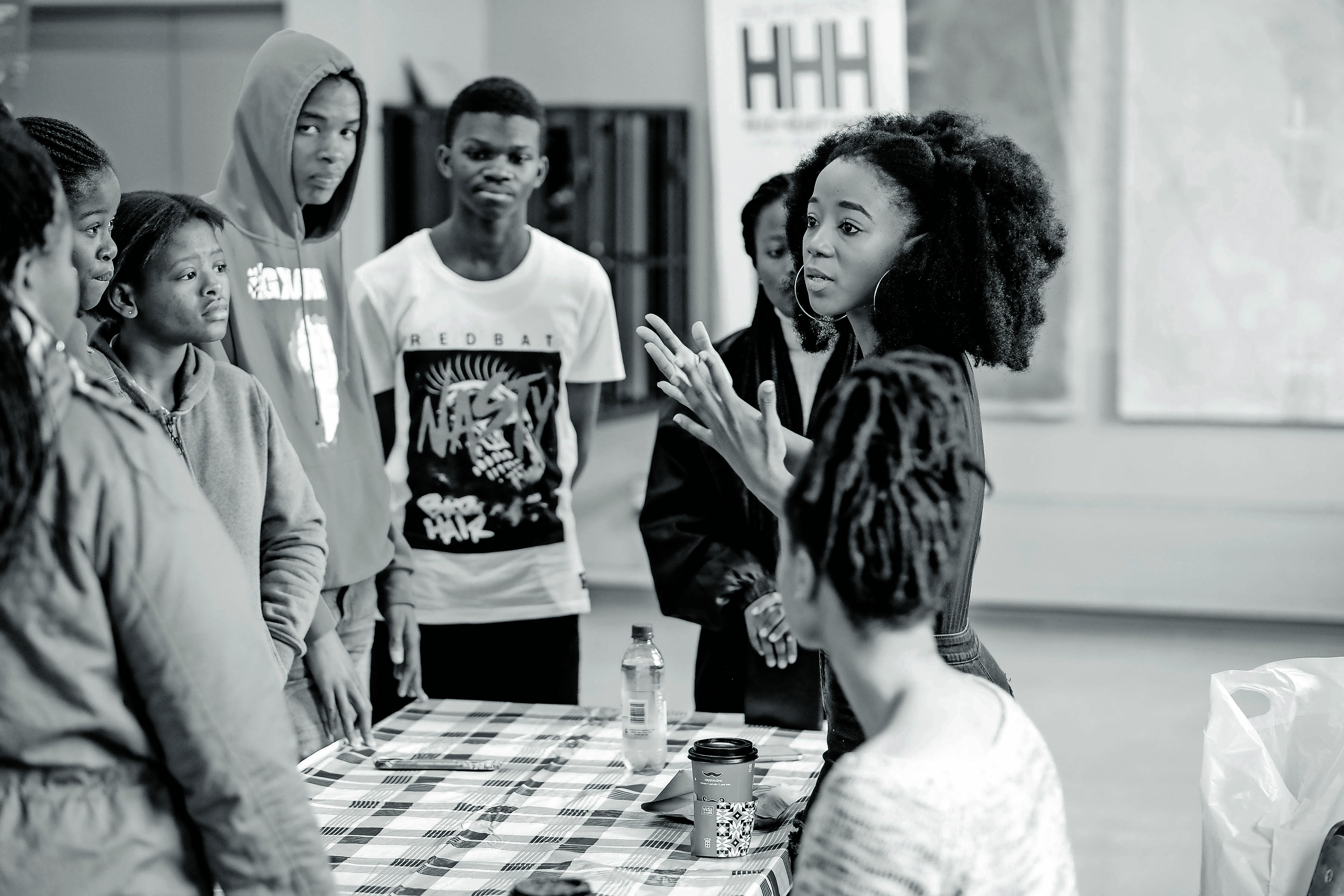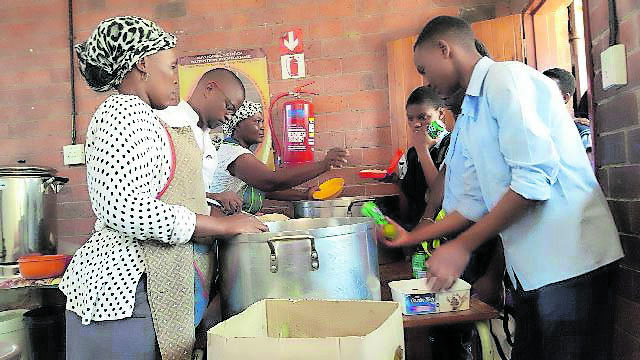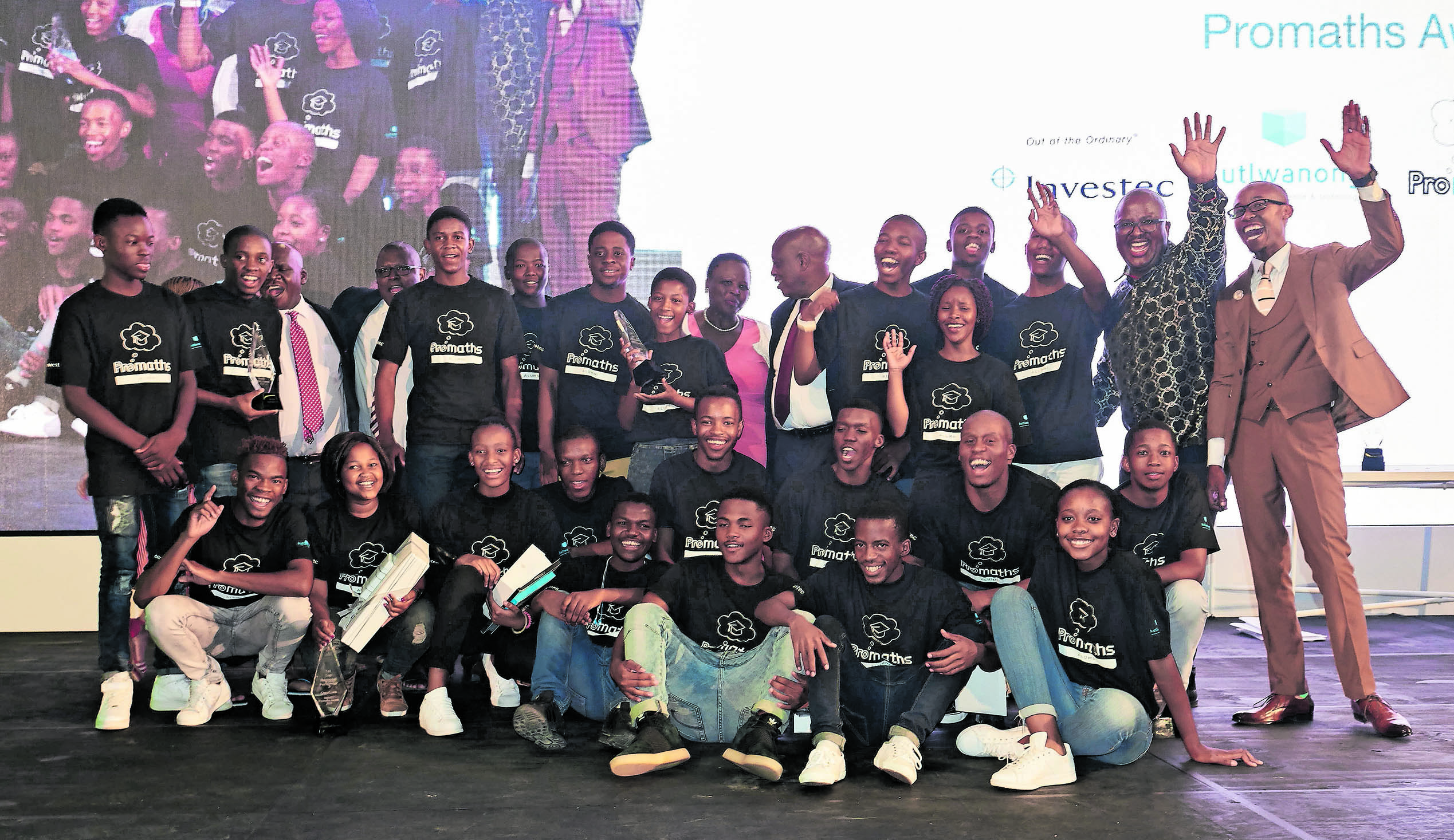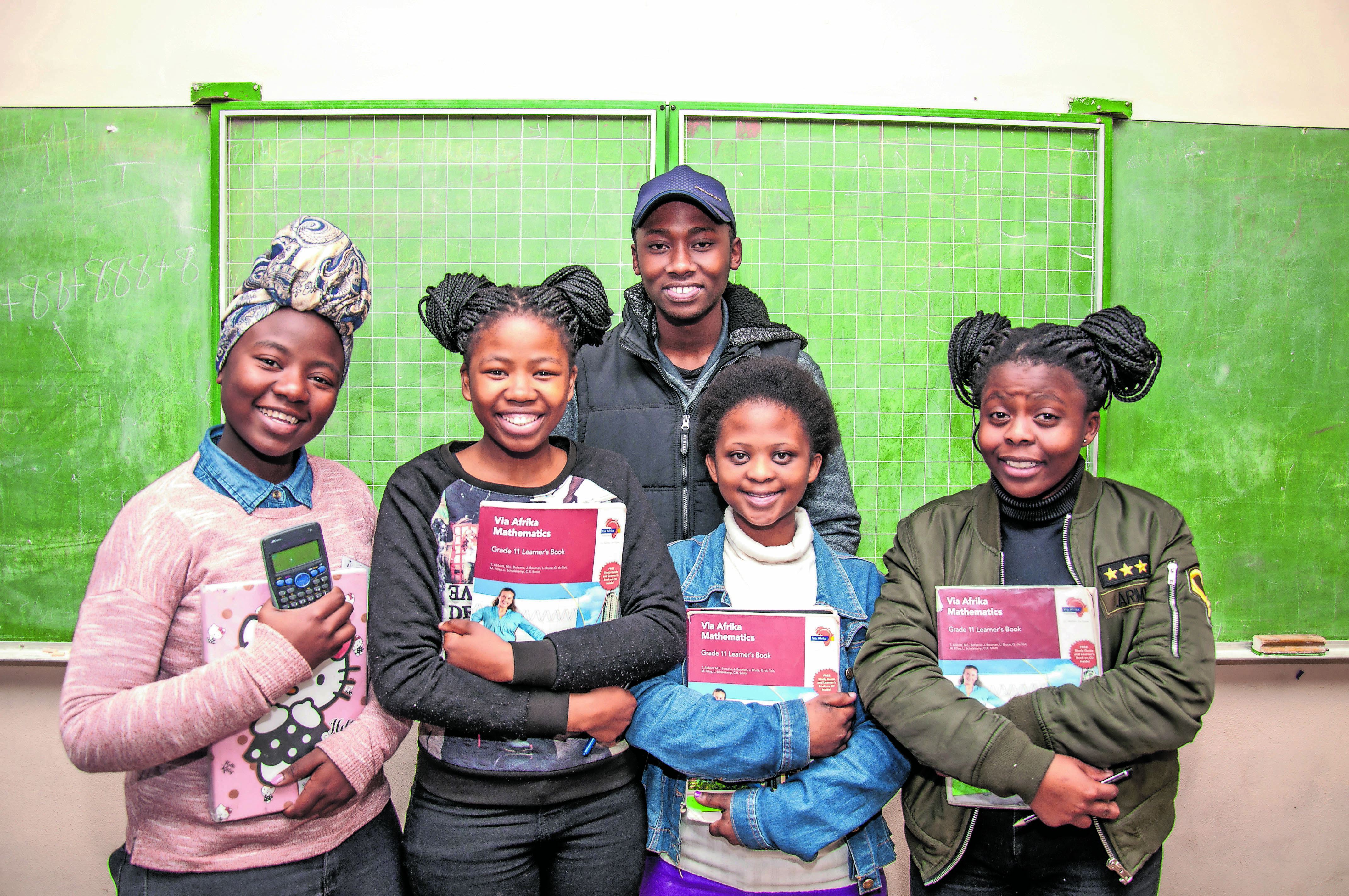The Transitions Foundation is staffed by volunteers who are passionate about youth development
Transitions Foundation
Transitions Foundation was founded by Dr Kopano Matlwa-Mabaso in 2011. In 2012 the organisation was officially registered and a partnership with Allanridge Secondary School in Rabie Ridge, Midrand was developed. The program’s intent is to improve the performance of young South Africans beyond just their academic needs and to improve on their psychosocial, literacy and life skills. Young people often face many challenges that they are unprepared for when they leave school and Transitions prepares pupils to overcome them and realise their dreams.
The Saturday School programme run at Allanridge Secondary School comprises 60 learners in grades 10-12. The programme includes maths and science tutoring, as well as a life skills programme that has specially curated master classes that exposed learners to the journeys of young professionals who have walked challenging yet successful roads. The master classes often leave the learners feeling inspired and energised. The skills sessions on the other hand feature a wide array of development activities in topics such as television production, sexual and reproductive health, communications and design. The Transitions programme also has a book club that fosters a reading culture among the students.
The Transitions programme is fully staffed by volunteers who are passionate about youth development. In addition there is a board of governors who oversee its strategic growth. It is largely funded by Go Ahead! a German nongovernmental organisation that raises funds to support African charities. Quantifiably, the work of the Transitions Foundation has facilitated an increase in the number of empowered young people with viable post-matric options.
The vision is supported by Allanridge Secondary School; the staff wish for it to be expanded to more learners each year. The school now produces an excellent (100%) matric pass rate each year, with an average of 1.5 distinctions per learner. Since the presence of Transitions at Allanridge (which was an MEC priority school due to underperformance at a 30% pass rate), the school’s matric pass rate has risen by over 65%. More than 80% of the learners have entered tertiary institutions and go on to succeed in their respective workplaces. It is the type of impact that not only changes the lives of the learners, but of their families and future generations as well.
Transitions intends to grow its programme beyond Allanridge Secondary School and to form partnerships with other schools in the Midrand township areas. In order to grow, Transitions is in need of financial support in the form of grants. Their budget sits at R370 000 per annum, which is often hard for them to meet. Furthermore, the programme requires passionate black professionals to volunteer their time as master class speakers and mentors, as well as to donate to the programme by “adopting-a-transitioner” for R5 000 per annum, which is R500 per month over 10 months.
Contact details: Sibongile Khumalo, managing director
[email protected]
www.transitionsfoundation.co.za

Fun Learning for Youth
Fun Learning for Youth (FLY), which was formed in 2010, is the brainchild of eight young professionals from different walks of life, who were interested in making an impact in the world around them through mathematics education. The 100%-volunteer-run initiative is modelled on the provision of maths lessons to disadvantaged students, and is complimented by life skills training so that students can tackle life challenges that exist outside of the classroom.
The three guiding values of Fun Learning for Youth are:
Accountability
Commitment and Compassion
Excellence.
FLY operates in Gugulethu at the JL Zwane Centre for grades 8-12, as well as at Realogile High School in Alexander, for grades 8-11. It has a cumulative base of 80 tutors. The lessons provided to the learners are a combination of teaching, practice and games to reinforce maths principles and encourage group work between the learners.
Over the years, a total of five scholarships have been provided for FLY graduates to attend tertiary institutions in South Africa, to the value of R390 000. The impact of the programme is measured in the improvement of the maths marks of the learners from when they join the programme to when they matriculate. Further impact is measured in the growth in confidence of the learners, both in themselves as people and in their aptitude for maths.
Regarding the future, the organisation hopes to have representation in all parts of South Africa so that more learners can have increased life chances and the opportunity to become young professionals, should they choose to. In order to be able to achieve these aims, the organisation is in need of: more volunteers to tutor and perform administrative tasks, funding for scholarships, catering and curriculum training support.
Contact details:
Cape Town Chapter Lead – Ayanda Vabaza
Johannesburg Chapter Lead – Qhama Macanda
https://funlearningyouth.org.za/about-us/

Phefeni Senior Secondary School Saturday School
Phefeni Senior Secondary School in Soweto achieved a 90% pass rate in 2018. This incredible achievement is the highest pass rate in the history of the school. The school has come a long way and its success is fundamentally attributed to the tireless work and vision of its principal Margaret Gasa, and the interventions that she has staged for the school to improve.
Gasa took over the school in 2017, and she approached entrepreneur Miles Kubeka about her students not having food to eat during the grade 11 and 12 Saturday classes, as the department of education’s feeding scheme only runs during the week. Prior to bringing Kubeka on board to attract partners to assist the school, Gasa was spending money from her own pocket to feed over 140 learners. Despite being committed to learn and attend the Saturday school, the learners were not fully concentrating.
“By the time she approached me she couldn’t even afford the R300 contribution from her pocket anymore. What shocked me was this Saturday meal was the only meal that most of the children would receive until Monday when they returned to school. The students would bring siblings disguised in their school uniforms so they, too, could come and eat. We ended up feeding close to 200 kids per Saturday,” says Kubeka.
With the help of organisations such as Makro and BevSA, the school has been able to provide a square meal for everyone who attends the Saturday classes. This means the students are now able to concentrate on their grade 11 and 12 maths and science classes as opposed to being distracted by a grumbling tummy. Kubeka personally believes that Phefeni can still improve on its 90% pass rate and get to a 100% pass rate.
The Saturday school is need of financial resources for 2019 so that they can bring on more tutors for learners, especially in light of the fact that teachers do not work on weekends. Beyond a high pass rate, Kubeka emphasises that it is important for the learners to achieve quality passes that will give them a variety of options when they leave school, as well as the capacity to give back to their communities.
Contact details: Miles Kubheka
[email protected]

Investec ProMaths
The Investec ProMaths programme been running since 2005 as part of a partnership between Investec CSI and the Kutlwanong Centre for Maths, Science and Technology. Learners from townships and rural areas across the country are offered maths and science extra lessons on weekends as well as during the school holiday period. The programme structure ensures that pupils are recommended by their teachers and they are sourced from feeder schools close to Promaths centres, ensuring that all learners are in close proximity to the lesson centres.
The collaborative program was created to bolster the number of pupils who matriculate with a high pass in maths and science and will therefore have a wide array of post-matric options. Nationally, there are currently nine Promaths centres in places such as Umlazi, Qwa-Qwa, Motherwell and Mamelodi.
Learners who participate in the Promaths programme have over the years upped their maths and science matric marks, which has resulted in them being able to access more opportunities and chart their paths as young professionals. Isah Mhlanga, who is today a chief economist at Alexander Forbes, is one such success story; she was part of the first cohort of ProMaths students from Dobsonville in 2008.
More than 1 200 learners who have done the ProMaths course pass matric with impressive marks every year, but a significant number of them are still unable to access funding for tertiary education. As a response to this, Investec and the Kutlwanong Study Trust have launched the Promaths bursary fund to help these learners pay for their studies. However, the bursary funds are inadequate to cover all the learners. The programme is need of sponsors and partners that can directly contribute to the funding of the learners’ futures.
Visit: www.investec.co.za / www.kutlwanong.org
or contact [email protected]

IkamvaYouth Programme
The IkamvaYouth Programme was founded in 2003 by Joy Olivier and Makhosi Gogwana, who were brought together by their understanding that many of the challenges that learners face are due to lack of information and support. Olivier, Gogwana and some their friends started volunteering as tutors and mentors.
Today, Ikamva has more than 15 national branches that support over 5 000 learners through a number of programmes. These programmes were co-created with both learners and tutors and they include services that include academic tutoring, career guidance and life skills. The volunteer tutors are sourced from a variety of backgrounds, but they are largely tertiary students and alumni who believe in active citizenship. The organisation also supports grade 12 students in their post-school opportunity applications and provides them with computer literacy and e-learning classes.
Ikamva’s differentiating factor is that it functions as a home for learners who often come from difficult environments; by the time they leave the doors of Ikamva they feel noticed and validated to reach their full potential. The programme has no academic requirements for entry, but learners are expected to attend at least 75% of the sessions to retain their place in the programme.
IkamvaYouth has entered into a 10-year partnership with the department of basic education in an effort to improve literacy in schools. The organisation works with community stakeholders such as school principals and municipal councillors to obtain access to venues. For over 16 years, the organisation has delivered excellent outcomes, and an independent evaluation indicated that the model has had a statistically significant impact. Since its first matric cohort in 2005, the organisation has maintained an 80-100% matric pass rate.
Of the 5 000 learners who have been supported in over 15 township locations over the last six years, more than 1 500 have completed grade 12 with the support of the programme; 84% passed and 73% were eligible for tertiary enrolment; 85% and more have accessed post-school opportunities including apprenticeships and jobs, and some have upgraded their matric to access better opportunities.
IkamvaYouth has a 2030 vision that “all learners who enrol in 2018 reach grade 12 or its equivalent, will pass and access opportunities, and within four years of matriculating, earn a dignified living”.
In conjunction with other organisations through the Community Collaboration Programme, it aims to implement this high-impact, low-cost model, so that more learners can be reached and quality passes can be achieved. Through the provision of training it is enhancing the implementation of this empowering model so that more people can have more access to life-changing opportunities.
Ikamva is in need of volunteers and mentors across five provinces, as well as laptops and data for learning and funding for some of its centres.
To get involved, contact:
Balisa Ntloko:
Acting business development manager
Email: [email protected]
Mobile: 074 605 3417
http://ikamvayouth.org/